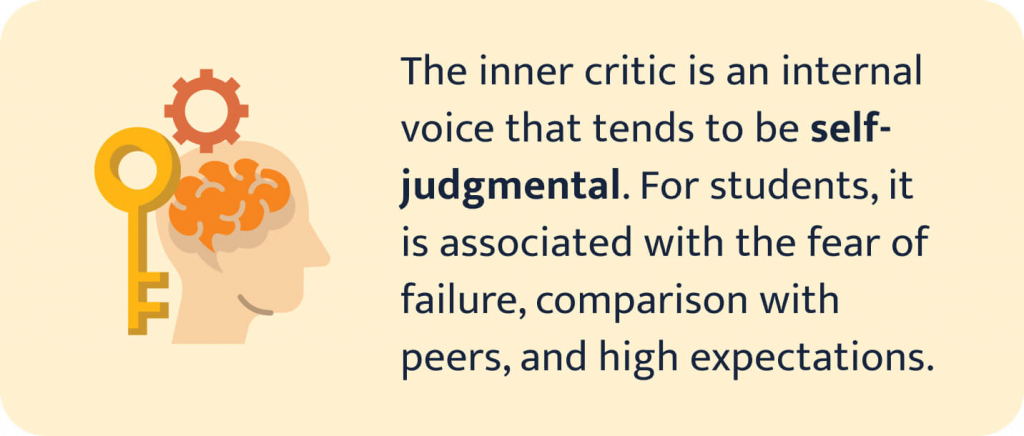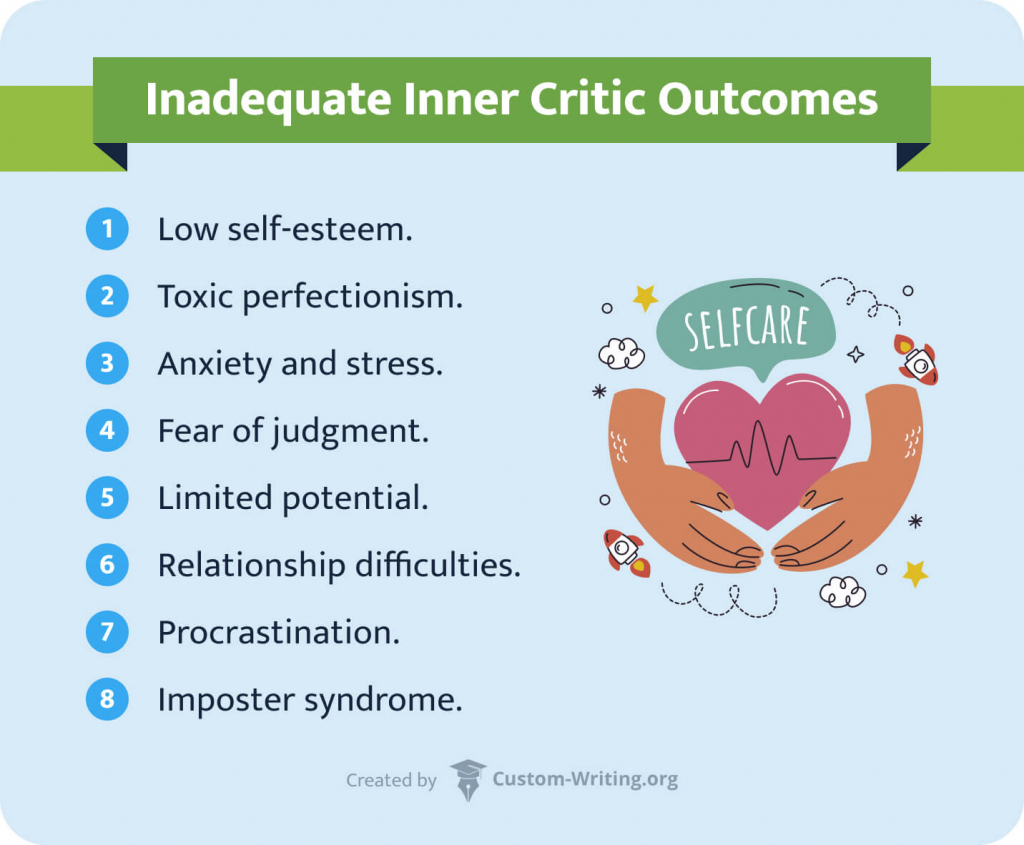Have you ever found yourself stuck in a cycle of self-doubt and criticism, constantly feeling as though you’re not good enough? Since social rejection poses a genuine threat to our existence, our self-criticism steps in to protect us by shaming us before others can. It makes us feel inadequate to drive us towards improvement. As students, we often encounter pressure to excel academically, socially, and professionally, which causes our inner critic to dominate our self-esteem.

In this article made by our custom essay writers, we’ll explore the concept of the inner critic and how practicing self-compassion can help us break free from its grasp. You will find out:
- Where does the inner critic come from?
- What are its worst consequences?
- How to overcome an inadequate critical inner voice?
- How to apply self-compassion to manage the inner critic?
📖 Inner Critic (Critical Inner Voice) – Definition
The term “inner critic,” also known as the “critical inner voice”, refers to the internal thought process that constantly evaluates, judges, and criticizes our actions and behaviors. This inner critic often manifests as negative self-talk, self-doubt, and feelings of inadequacy.
The inner critic can significantly impact your mental health and well-being. It can lead to high levels of anxiety, low self-esteem, and even depression. It can also contribute to imposter syndrome, where people fear being exposed as frauds and believe they are unworthy of their accomplishments.
In simple terms, the inner critic is like a little voice in your head that says unkind things about yourself, making you feel as though you’re not good enough or constantly making mistakes.
Here are some examples of when the inner critic may take over:
- You’re struggling to understand a difficult math concept, and your inner critic tells you you’re not smart enough to figure it out, making you feel discouraged and frustrated.
- You’re self-conscious about your outfit, and your inner critic insists you’re not attractive enough, leading to insecurity and low self-esteem.
- You’re overwhelmed by the demands of college and your job, and your inner critic asserts that you cannot handle the workload, causing you to experience stress and anxiety.
Where Does It Come From?
From a psychological perspective, the inner critic is believed to originate from early childhood experiences, societal expectations, and personal insecurities. It is often shaped by external influences such as parental criticism, societal standards of success, and comparisons to others. Over time, these external factors become internalized and serve as the foundation for the inner critic.
The prefrontal cortex, the part of the brain responsible for decision-making and emotional regulation, isn’t fully developed until age twenty-five. If individuals constantly hear harsh criticism during this critical developmental period, it can lead them to adopt negative beliefs about themselves and harbor self-doubt.
Example:
Consider the case of Megan, a college student who grew up in a family where academic achievement was highly emphasized. Despite her parent’s good intentions, they frequently compared her to her older sibling, an A+ student. They often used phrases like “Why can’t you be more like your brother?” or “You need to work harder to succeed in life.” As Megan progressed through her education, she internalized these critiques. Despite achieving good grades, she never felt it was sufficient. Her inner critic began to manifest with thoughts like “You’ll never be as smart as your brother” or “No matter how hard you try, it won’t be enough”.
Because of her childhood experience, Megan developed an inner critic that led to her fear of failure and a persistent sense of not living up to expectations. However, these are not the only possible negative consequences of excessive self-criticism.
🤯 Impacts of an Inner Critic
In small doses, the inner critic can be a source of self-awareness and motivation, driving individuals to make positive changes. However, when it becomes overpowering and unrelenting, it can result in various detrimental effects, including:
- Low self-esteem. The constant negative self-talk can erode your sense of self-worth and confidence, affecting various aspects of your life, including your studies, career, and relationships.
- Perfectionism. The inner critic often sets unrealistic standards and expectations, leading you to strive for perfection in all areas of your life. Perfectionism can result in chronic stress, anxiety, and a fear of failure, as well as an inability to appreciate your accomplishments.
- Anxiety and stress. Persistent self-criticism can lead to heightened levels of anxiety and chronic stress as you constantly worry about falling short of your own or others’ expectations. Moreover, ongoing self-criticism can contribute to emotional lows that can develop into severe mental health conditions like depression.
- Fear of judgment. The inner critic can instill a fear of being judged or criticized by others, causing you to hold back and avoid taking risks. This can result in feelings of isolation and a lack of authenticity in relationships and social interactions.

- Limited potential. Excessive self-criticism can hinder personal and academic growth. This results from the self-imposed limitations and barriers that prevent you from pursuing new opportunities and reaching your full potential.
- Relationship difficulties. The inner critic can impact your ability to establish and maintain healthy relationships by fostering feelings of unworthiness, insecurity, and a fear of rejection. This can create barriers to intimacy and vulnerability, as well as lead to conflicts and misunderstandings in relationships.
- Procrastination. Negative self-talk can lead to procrastination and avoidance of tasks or responsibilities, as you may fear not meeting your or others’ expectations.
- Imposter syndrome. Constant negative self-talk can contribute to imposter syndrome, characterized by feelings of being a fraud or not deserving success or recognition. This can result in an enduring fear of being exposed as inadequate or incompetent.
🚀 Benefits of an Inner Critic – Use It to Your Advantage
The inner critic can serve as a valuable source of self-reflection and self-improvement when it provides constructive feedback in a balanced and healthy manner. Thus, a well-managed inner critic, without excessive self-judgment or unrealistic expectations, can offer several benefits:
Self-compassion is crucial in maintaining healthy self-criticism and nourishing all the above outcomes. It counteracts the harmful effects of the inner critic, allowing you to grow from your experiences rather than becoming trapped in a cycle of self-judgment. Self-compassion helps build a wholesome relationship with your inner critic, promoting personal growth and well-being. In the following section, let’s learn more about self-compassion and its role in your well-being.
🫶 Self-Compassion – Essential for Well-Being
Self-compassion is a crucial aspect of well-being from a psychological standpoint. It refers to the ability to treat yourself with kindness in the face of failure or suffering. Being self-compassionate means acknowledging your misery and responding with empathy and non-judgmental self-care. Thus, a specific dose of self-compassion is of great help when managing your inner critic.
Kristin Neff, a professor of Psychology at the University of Texas, identifies three primary components of self-compassion:
- Self-kindness. Self-compassion entails treating yourself with kindness when confronted with pain and personal shortcomings rather than dismissing them or engaging in self-criticism.
- Common humanity. Self-compassion also involves acknowledging that challenges and personal failure are normal and universal aspects of the human experience instead of feeling isolated in these struggles.
- Mindfulness. Self-compassion comprises managing negative emotions in a way that neither ignores them nor allows them to become overwhelming. It involves openly observing negative thoughts and accepting them without judgment.
It’s vital to distinguish self-compassion from self-pity. Self-compassion encourages a kind and empathetic attitude towards yourself, while self-pity often leads to feelings of helplessness and self-victimization.

A Way to Treat Your Inner Critic
Practicing self-compassion can offer significant benefits to students prone to excessive self-criticism. It can help diminish inadequacy or shame while fostering resilience and self-worth. Moreover, it encourages the development of a healthier and more balanced perspective on your achievements and setbacks. Instead of tying your self-worth solely to your accomplishments, self-compassion allows you to recognize your inherent value as a person.
Self-compassion involves adopting the “How would you treat a friend” approach. Imagine how you would support a friend going through a difficult time or experiencing distress. For example, when a friend makes a mistake or feels down, we offer empathy, understanding, and support rather than harsh criticism. The same level of kindness and understanding must be applied to yourself when facing challenges or emotional distress.
🎯 How to Overcome Your Inner Critic with Self-Compassion
Don’t miss our guide if you want to overcome your inner critic and cultivate a more compassionate and supportive relationship with yourself. Here are the steps to help you along the way:
1. Identify your inner critic.
The first step in battling your inner critic is to admit its presence. Pay close attention to the negative self-talk and harsh judgments in your mind. Recognize moments when you are overly critical of yourself and understand that this voice doesn’t define your true essence.
2. Separate from your inner critic.
Once you have identified your inner critic, it is important to differentiate it from your authentic self. Understand that your inner critic is a learned voice shaped by past experiences, societal influences, and personal insecurities. To achieve this, write down your thoughts as “you” statements to create distance between yourself and your inner critic. For instance, instead of thinking, “I’ll never be good enough,” rephrase it in writing as “You’ll never be good enough.”
3. Respond to your inner critic.
When your inner critic starts bombarding you with negativity and self-criticism, challenge those thoughts with compassion and understanding. Combat your inner critic by reframing its negative thoughts with more realistic and compassionate self-assessments. For instance, instead of thinking, “I’m such a failure,” try rephrasing it: “I may face challenges, but I have many strengths.”
4. Treat yourself as you would a friend.
When overcriticizing, adopt the “How would you treat a friend” approach. Visualize how you would respond to a friend experiencing the same self-doubt. Offer yourself the same level of empathy, understanding, and support you would give to a friend in need.
5. Embrace mistakes.
Understand that making mistakes is a natural part of being human. Instead of criticizing yourself for your imperfections, embrace them as opportunities for growth and learning. Allow yourself the grace to make mistakes without attaching them to your self-worth.
6. Release the need for external validation.
Overcoming your inner critic also involves letting go of the constant need for validation from others. Instead of seeking approval from external sources, focus on building self-confidence and self-acceptance from within. Trust in your worth, independently of others’ opinions. While seeking feedback and input from others is essential, be selective about whose opinions you value.
🧨 Other Ways to Deal with Your Inner Critic
Here are some bonus tips on how to overcome your inner critic that you can easily incorporate into your daily routine:
- Write down your thoughts. Keep a journal to record your self-critical thoughts and analyze patterns. This can help you identify triggers and underlying beliefs.
- Utilize positive affirmations. Replace self-critical statements with positive, affirming ones to counteract negative self-talk.
- Seek external perspectives. Talk to a trusted friend, relative, or mentor who can provide a more objective view of your abilities and achievements.
- Set realistic goals. Establish achievable goals and celebrate progress rather than solely focusing on perceived shortcomings.
- Create a self-compassion mantra. Develop a phrase or statement that embodies kindness and understanding toward yourself, and repeat it when the inner critic emerges.
- Practice mindfulness. Try meditation techniques to stay present in the moment. Meditation will also help you observe your thoughts without getting caught up in self-critical narratives.
- Reframe mistakes as learning opportunities. View setbacks as chances for growth and development rather than reasons for self-criticism.
- Limit comparisons. Stop comparing yourself to others, as this can fuel feelings of inadequacy and trigger the inner critic.
- Visualize a supportive figure. Imagine someone who embodies empathy and support and visualize them offering comforting words during moments of self-criticism.
- Engage in self-soothing activities. Participate in activities that comfort you, such as listening to soothing music or spending time in nature.
- Surround yourself with positive influences. Spend time with people who uplift and support you, and limit exposure to individuals who reinforce self-critical tendencies.
- Practice gratitude. Focus on the things in your life that you are grateful for, shifting your perspective away from self-criticism. Consider making a gratitude collage or starting a gratitude journal.
- Celebrate self-improvement. Acknowledge and celebrate your efforts in overcoming self-criticism, no matter how small they may seem.
- Seek professional help if needed. If self-criticism significantly impacts your well-being, consider asking a therapist or counselor for guidance and support.
🖼️ Managing Your Inner Critic – Infographic
Cultivating self-compassion and overcoming the inner critic is a transformative journey that can help you guide the challenges of academic life and personal growth. Recognize the origins of your critical inner voice, question its validity, and embrace self-compassion to build a foundation of resilience and emotional well-being.

Remember it’s all right to make mistakes and learn from them because nobody’s perfect. Neither these mistakes nor your inner critic should stop you from pursuing your dreams.
🔗 References
- How to Deal with an Especially Cruel Inner Critic
- How to stop criticizing yourself and befriend your inner critic – The Washington Post
- The Hazards of Self-Criticism | Psychology Today
- Therapy for Self Criticism, Therapist for Self Criticism
- Self-Compassion for Students | Greater Good In Education
- How to stand up to your inner critic – Rick Hanson, Forrest Hanson, TED
- How to understand your inner voice and control your inner critic – Caroline Williams, New Scientist









![How to Organize a Successful Study Group [GUIDE]](https://custom-writing.org/blog/wp-content/uploads/2023/04/doing-homework-together-1-284x153.jpg)
![The Scaffolding Technique in Education: Benefits & Examples [Is It Really Useful?]](https://custom-writing.org/blog/wp-content/uploads/2023/03/business-women-signature-document-1-284x153.jpg)
